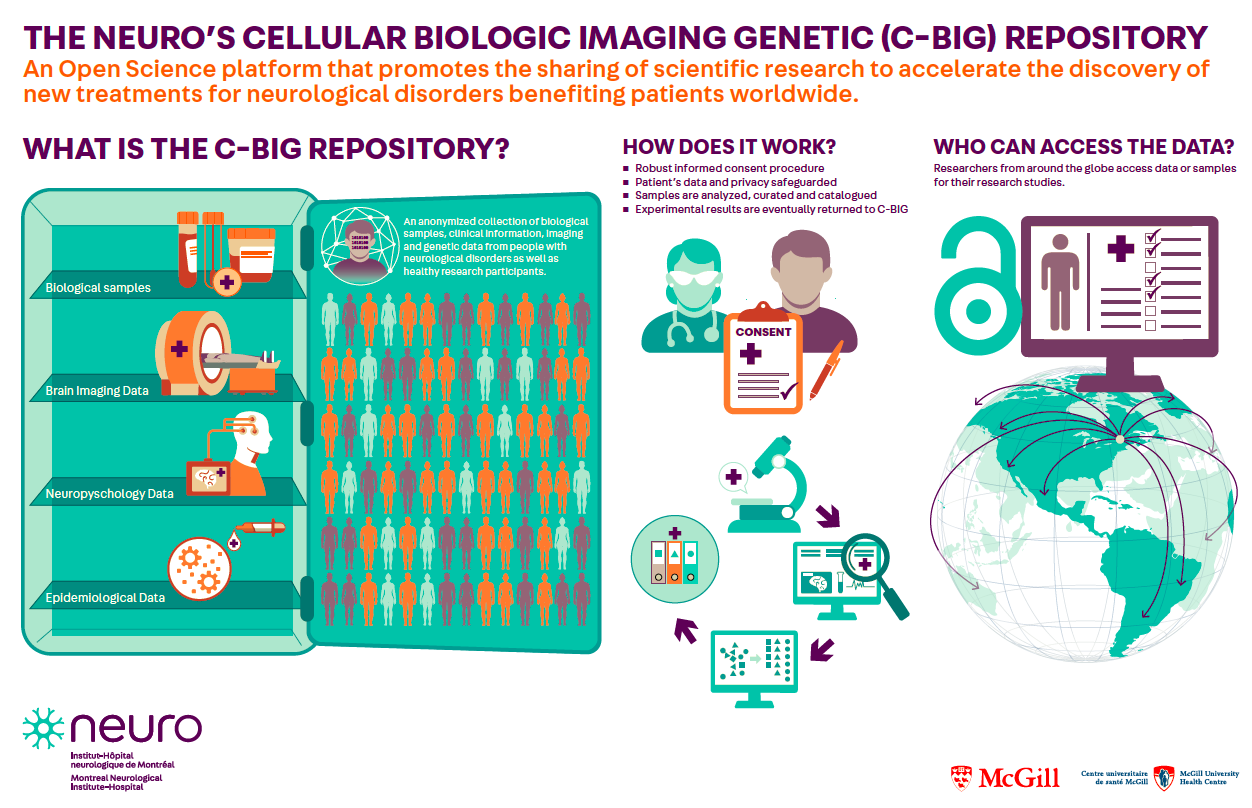For the last four years, the Clinical Biologic Imaging and Genetic (C-BIG) Repository has been recruiting patients and healthy controls, as well as collecting longitudinal and clinical information, imaging, and genetic data. This collection is now open to outside collaborators, and its director, Dr. Jason Karamchandani, is calling on researchers to access the data and provide feedback to improve the portal over time.
“This is a very exciting time,” he says. “We have worked hard to establish an ethical framework that allows us to recruit from both adult and pediatric populations. To date, we have recruited nearly 3,000 patients and healthy controls.”
The C-BIG Repository is an Open Science collection of biological samples, clinical information, imaging and data from people with neurological disorders as well as healthy research participants. It was established in 2016 as part of The Neuro’s Tanenbaum Open Science Institute.
Since then, Dr. Karamchandani and his team have been collecting and storing biospecimens, clinical, imaging, and genetic data to create a repository that scientists around the world can use to investigate neurological disorders with an aim to develop better treatments. Of the nearly 3,000 individuals included in the biobank, more than 1,000 have had some form of genome-wide interrogation. C-BIG’s largest collections are from patients with Parkinson’s disease, ALS, neuromuscular diseases, with growing collections in multiple sclerosis, autism, and fronto-temporal lobar dementia.
The most challenging aspect was building this platform with the principles of Open Science at the forefront. While many other biobanks exist, the C-BIG Repository is unique because the framework incorporated the principles of Open Science from the start. From the patient consent process onward, the team had to design tools that would allow for data sharing while respecting and protecting patient privacy. One of the solutions was to implement a system of tiered-access where certain data is fully open, while data that is more sensitive requires an electronic signature that the user agrees to terms and conditions; the user essentially promises ‘to do no harm’. As for biological samples such as cerebrospinal fluid that are non-renewable, a ‘Tissue and Data’ committee considers each access request on a case-by-case basis.
“We weren't just able to reinvent the wheel,” says Dr. Karamchandani. “We are building something quite unique here, and we had to innovate as the project evolved.”
Now that the platform is live (https://cbigr-open.loris.ca/), researchers can access the data portal and select relevant data to advance their research. Dr. Karamchandani hopes that users will provide feedback that will help the C-BIG team make improvements to help build the most useful tool for the research community. “It is a co-development phase”, Dr. Karamchandani says, “where researchers get to be part of the C-BIG Repository’s implementation and growth.”
“We don't want to create this in a vacuum,” he says. “We want to build something our users need, not something that we think they need.”
Dr. Karamchandani says he looks forward to seeing the research that is enabled by the C-BIG Repository, and is proud of the role it will play in the future of neuroscientific research.
“This data was collected with the aim of sharing it with the broader scientific community,” he says. “And that's really what's fundamentally unique about this. At every point in time, we were expecting to share this data with investigators around the world.”
The C-BIG Repository database is available here
More information on the Repository
Patients at the heart of Open Science








